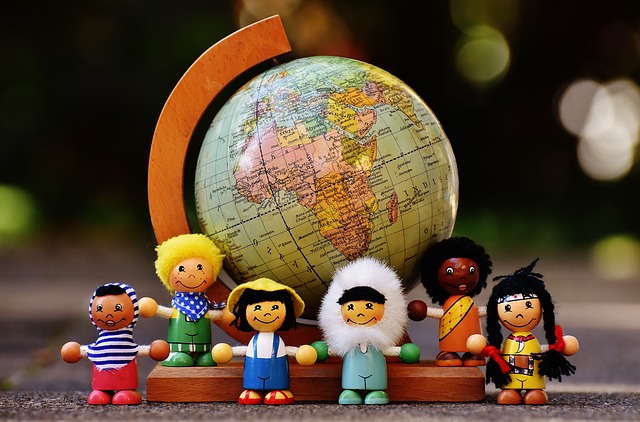Do you miss a friend from your childhood with whom you have shared very special moments in your life? Are you one of those who think that children’s friendships are very important? Friends are a very important part of our lives, since it is with them that we share special moments. They become as important as our families and we can always count on them. It may be that, with the passage of time, friendship takes a back seat. In our childhood, friends are a fundamental part of our happiness and development.
 Therefore, in this article we will talk about what friendship is for children. If we have children, it is important that we know the meaning and value of a friend at such an early age. Maybe sometimes, from our position as parents, let’s forget what we were like as children and how much we wanted to have fun.
Therefore, in this article we will talk about what friendship is for children. If we have children, it is important that we know the meaning and value of a friend at such an early age. Maybe sometimes, from our position as parents, let’s forget what we were like as children and how much we wanted to have fun.
It is a fairly common mistake, otherwise totally normal, to treat our children in a certain way. Sometimes, for wanting to give them the best education, we forget that they are children. And most importantly, we forget that we too have been children. At certain ages it is very important to have fun; this does not prevent them from receiving a good education. One thing is as important as the other, but they are not, far from it, at odds. You have to assume that they are children and that they are not going to be perfect. Nor should they be, this means accepting their mistakes and not punishing them too much with it. On the contrary, try to correct it in a positive way and make the reason understood. Always trying to put himself in his position. For this it is highly recommended to remember our childhood and what bothered us when we were scolded and punished. Surely at that time we would have wanted another type of communication.
Friendship for children
In childhood is when a person begins to develop their character and their way of being. Based on the experiences you go through at this stage, it will be one way or another. It is a stage of continuous learning, so it is very important to take into account the values that we are transmitting to them. Therefore, it is convenient that they learn to relate to other people, in this way they will improve their social skills. Empathy, affection and companionship are one of the many values on which we must emphasize. We have to take into account what friendship means for children, since they promote the previously mentioned behaviors and social skills. It is at these ages when many friends are made, whether at school, the park, extra-curricular activities, etc. This stage is one of the most beautiful, and it is when we are happy.
The childhood stage is the foundation on which a person develops. This base is strengthened and formed with deep roots by lived experiences. At these ages, children are like sponges that absorb concepts and values in a deeply rooted way. Once these lessons are internalized, they are very difficult to change in the long run. For this reason it is very important to think about the education we are giving our children. Many future behaviors and decisions that can be made at certain ages will depend on this. It is like a path that we are marking out for them, within the framework of their desires and way of being. This tour is conditioned by the meaning of friendship for children, since friends have a great influence. It is an undeniable fact that we have to accept and it is only up to us to give you the best advice.
Instructions
As we have pointed out before, friendship for children is a crucial aspect in their development. The importance of learning and evolving in social skills can mark the way and your future. In this section we will talk about how children can make friends.
- At school. School is a place where children develop all their abilities and potential on a concrete basis. This base is formed by certain values and social conscience. Although education is, for the most part, the responsibility of parents, at school the kinds of behaviors they learn are essential. Not only do you go to classes to acquire knowledge in different subjects, but also to know how to handle yourself in life. It is at this school stage where the characteristics of a person are seen. Given the time they spend Monday through Friday in class, it’s an ideal situation to make friends. Within a class group, they will surely form different groups that they themselves decide. Depending on the tastes and ways of being, they themselves, in a natural way, come together. Here they are aware of what Friendship is and its meaning.
- Extra-curricular activities. It is in these activities where children communicate with other children who have the same tastes. It allows them to meet people similar to them, which is a great bonding point. If there is something that brings people closer, it is sharing hobbies and moments of happiness. For this reason, it is advisable that our children go to some activity such as sports or some other hobby. Apart from teaching them values through sport, they will also strengthen ties with their peers. They should not be too many hours a week, since between school and activity there may not be much free time left.
What do you need
Knowing the different scenarios in which friendship for children is essential, we must know what they need to relate to. They are skills that they have and develop in a natural way, but parental supervision always comes in handy. To interact with other children and make friends they will need the following characteristics:
- Generosity. It is a somewhat difficult skill to develop at certain ages, since the sense of ownership is very present in behavior. It is very important that they grow up learning to share their toys, moments and properties with other children. It is definitely a value that will make them better people and have healthy relationships throughout their lives.
- Tolerance. During childhood, children, like the older ones, tend to point to someone who is different or goes out of the way. It is an attitude that we must correct from the beginning in order to have a tolerant society. Instilling this value in him will make him have an open mind and not discriminate. Not being closed in a certain way of thinking is essential to continue growing as people throughout the stages of life.
- Solidarity. In the daily life of a child, whether at school or in leisure time, problems arise. Situations in which a child needs a little help. In these scenes, encouraging our son to help the other person will teach them to be supportive. They will feel better and at the same time they will have helped another person. It is a habit that everyone, in our adult life too, should have. Criticizing and pointing out attitudes that oppose this thought is our duty as educators. The easy thing is to mess with people in need, in search of social approval. If we make them understand that it is wrong, we will have advanced a lot.
Tips
Friendship for children, as we will already know, is vital to their happiness. Promoting, favoring and creating scenarios that help foster friendship are beneficial for our children. Sometimes we can “go overboard” with punishments. Although our goal is to make them understand that they learn the lesson, we can cause just the opposite effect. Faced with a situation taken as an attack, children become more defensive and lock themselves in their way of thinking. Going with a friendly attitude, explaining the problem with authority and understanding can be the solution. In this way, we will encourage our son to reflect and increase his analytical capacity. Not to mention also that we will not be the enemy, so they will be more predisposed to pay attention to us. Children need rules and routines to teach them how to behave, but these should not be too rigid. They are children and, above all, they must be happy.
It may be that, at certain ages, we do not know how to choose our friendships in the right way. Since we only seek to have fun and have fun. This can bring us closer to adopting certain attitudes and habits of dubious morality. Not all children are the same or have the same reaction to the same circumstances. We must take this into account and provide an environment that inspires him to behave appropriately. As well as knowing how to behave and providing them with all the tools to release their potential on the right path. This learning has a determining impact in adolescence and in other stages, so the value of friendship will be a factor with a main role in said development.
Making friends not only inspires them with certain values, it has a positive impact on their self-esteem and confidence. As surely we have heard at some time; the greatest treasure is a good friend.

















